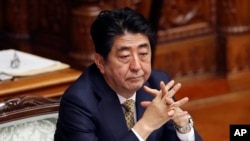Prime Minister Shinzo Abe’s sinking public support may be causing some political discomfort but is not expected to impede his plans to expand the country’s military mission. Nor will it likely change regional perception of Japan as a country intent on becoming again a military force in Asia.
Tokyo Tuesday suspended work on a new U.S. military base in Okinawa. In the last year ongoing protests at the base and demands by Okinawa Governor Takeshi Onaga to reduce the American military presence had put regional popular sentiment at odds with Abe’s strong support for strengthening the Japan-U.S. military alliance.
The controversial expansion project at the U.S. Marine Corps base Camp Schwab is intended to replace the Futenma airbase in the congested southern part of Okinawa. Opposition to the base is fueled in large part by local grievances, resentment over the continued U.S. military presence that occupies 20 percent of the islands, and by what is perceived as a broken promise by Tokyo to reduce that military presence.
“The people of Okinawa are against the fact that the Japanese government is saying this is a reduction because it is not,” said Junichi Tomita, the president of Ryukyu Shimpo, one of Okinawa’s influential newspapers.
Abe Tries to Contain Political Damage
The temporary work stoppage in Okinawa is being viewed by some as a move to contain the political damage the prime minister is taking over the new defense measures he is backing in the Japanese parliament. The bills would give the military more latitude to defend its people and interests, to participate in collective self-defense and defend allies like the United States.
Robert Dujarric, the director of the Institute of Contemporary Asian Studies at Temple University in Tokyo, saud the legislation will not significantly alter post-World War II Japan’s reluctance to utilize military force nor change its status as a junior partner of the United States.
“Japan after the passage of this legislation will very much be what Japan was before,” said Dujarric.
But memories of Japan’s past wartime aggression fuel both significant domestic pacifist opposition and regional criticism abroad.
Symbol of a Militaristic Past
Prime Minister Abe’s family ties and actions have also helped stir the controversy. The hawkish, conservative prime minister is the grandson of rightwing politician Nobusuke Kishi, an industry minister during World War II who was arrested by the Allied Occupation forces for being a suspected war criminal.
The prime minister’s visits to controversial war shrines and tendency to downplay atrocities committed by the Japanese military during the war, Dujarric said, shows a lack of political skill for a leader trying to build support for a stronger military.
“You’re not talking about a first class politician. I mean this isn’t the guy who’d rank in the top ten percent,” said Dujarric.
Public Opinion Opposes Militarism
In Japan, thousands protested after the passage of the security legislation in the lower house of parliament. According to opinion polls, a majority of Japanese oppose the security bills, and Abe's approval rating is less than 40 percent.
Although opposition is growing, it is still not strong or organized enough to stop the passage of the bills in the upper house of parliament, where Abe still holds a two-thirds majority.
Nor have Japan’s neighbors China and South Korea been reassured by the growing domestic opposition to changing the country’s pacifist constitution. Both have voiced concerns over the seeming rise of militarism and nationalism in Japan.
“It has been three years since Abe took power and resistance from Japanese has just begun at this point,” said Hosaka Yuji, a political science professor at Sejong University in South Korea.
Many Asian leaders have urged the prime minister to reassure the world about Japan’s military intentions by making a strong apology for Japan’s past wartime atrocities when he makes a statement on the 70th anniversary of World War II.
VOA Seoul Producer Youmi Kim contributed to this report.





